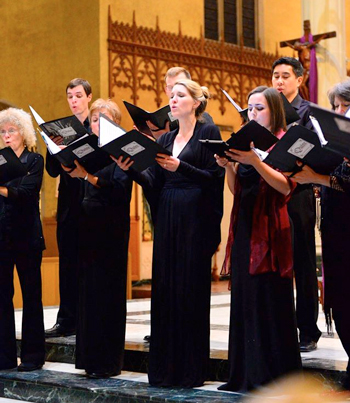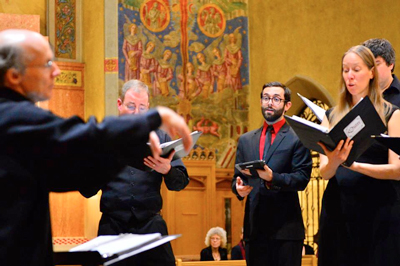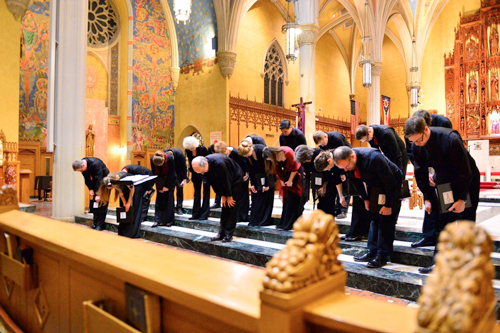by Daniel Hathaway

Over the centuries, erotic poetry preserved in The Song of Songs has become fodder for spiritual metaphors between God and Israel, between Christ and the Christian Church, and between the Virgin Mary and the faithful. Friday’s program brought together pieces in Latin, English, German, Hebrew and English crafted by sixteen composers ranging from the fifteenth to the twenty-first centuries, and included both Jewish cantillation and medieval Christian chant. For this occasion, Quire’s nineteen professional singers were expertly and sensitively led by guest conductor David Fallis of the Toronto Consort.
After women’s voices sang Flores appareuerunt from behind the altar (with a superb, clear solo by soprano Margaret Carpenter), Fallis and Quire took the large audience on a multi-century tour, stopping in Spain for pieces by Guerrero and Victoria (his madrigalesque Nigra sum, sed Formosa), and in Italy for Monteverdi (Pulchrae sunt genae tuae). Two German composers had already studied the Italian style abroad, as Heinrich Schütz demonstrated in Ego dormio / Vulnerasti cor meum (full of Venetian text painting) and Melchior Franck in Ich sucht des Nachts in meinem Bette (replete with harmonic sequences).
The program visited the New World with William Billings’ infectious I am the Rose of Sharon, then returned to Britain to pick up delicious Anglican souvenirs: Edward Cuthbert Bairstow’s I sat down under his shadow, William Walton’s Set me as a seal (with fine incidental solos by tenor Corey Shotwell and soprano Madeline Apple Healey), and Ivan Moody’s recent, ecstatic setting of Canticum canticorum I.
Speaking engagingly between pieces in lieu of program notes, David Fallis introduced Daniel Singer, who provided a sonorous Hebrew cantillation of a passage from Song of Songs that itself introduced American William Sharlin’s jazzy Shir Hashirim.
Continuing with North American music, the late Canadian composer Healey Willan was represented by the lovely, flowing diatonic counterpoint of I beheld her, beautiful as a dove, and Rise up, my love. A side trip to Scandinavia visited music by Norwegian composer Edvard Grieg. Hvad est du dog skjon, one of his Psalmen, was a rich setting of a Danish paraphrase from The Song of Songs by Hans Adolf Brorson. The incidental solo was handsomely sung by baritone Brian MacGilvray.
Textures got complicated at the end of the program as Quire rearranged its lineup for two polychoral pieces. Orlando di Lasso’s Osculetur me and Hieronymus Praetorius’s Tota pulchra es split the singers first into two, then into three groups (with two groups of three singers on each side flanking the larger ensemble). Even spread over multiple voice parts, Quire achieved a splendid effect in St. John’s reverberant acoustics.
The large audience (St. John’s ran out of programs early on) clamored for an encore. Fallis had one in his back pocket: Canadian composer Andrew Donaldson’s setting of Ego dormio, a fresh, pop-ish piece, continued the long list of different styles composers brought to this evocative collection of ancient love poetry.
On Friday, Quire’s well-blended sound, precise intonation, and vibrant interpretations of music both old and new once again added up to a highly satisfying evening of choral music.
Photos by Alex Belisle.
Published on ClevelandClassical.com March 2, 2015.
Click here for a printable copy of this article




